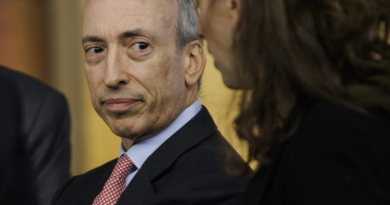Ex-CEO of scandal-plagued Wells Fargo sues, claiming bank underpaid him by $34 million
Tim Sloan sued Wells Fargo & Co. for more than $34 million, saying the company illegally withheld years of unpaid compensation after he stepped down as chief executive officer in 2019.
Sloan is seeking to force Wells Fargo to honor multiple canceled stock awards and a bonus he says he was promised, according to a complaint filed Friday in California state court. He’s also seeking unspecified damages for, among other things, emotional distress.
The former CEO led Wells Fargo from October 2016 to March 2019, a period in which problems multiplied across business lines and the bank was hit with costly regulatory penalties, including a Federal Reserve-imposed cap on growth that has yet to be resolved.
Sloan claims in his suit that those problems predated his tenure, and that he worked to correct them as CEO. He said no one on the board blamed him until they became the subject of political and media criticism after his departure from the bank.
Wells Fargo is “depriving Mr. Sloan of tens of millions of dollars in deferred compensation he had earned during his career,” according to the complaint. “To this day, Wells Fargo has failed to identify anything Mr. Sloan did or failed to do that would justify its decision.”
While it’s not unusual for financial firms to face legal battles over deferred pay, it’s rare at the CEO level. When Wells Fargo announced Sloan’s exit, it described the move as “his decision” and said it reflected his “commitment” to the company, characterizations cited in Sloan’s complaint.
“Compensation decisions are based on performance, and we stand by our decisions in this matter,” a spokesperson for Wells Fargo said.
Sloan, 63, took over Wells Fargo weeks after a scandal involving fake customer accounts erupted at the firm. John Stumpf, his predecessor who had run the bank since 2007, stepped down amid intense scrutiny from Washington and beyond.
Reform attempts
As president and chief operating officer, Sloan was Stumpf’s obvious replacement from inside the firm. He rose through the wholesale arm rather than the consumer division where employees had created millions of unauthorized accounts to meet sales goals.
After taking over, Sloan launched a series of reforms, saying in a 2018 Bloomberg interview: “You name it, we’ve changed it.” But as an insider, he faced criticism from the start that he wasn’t the right person to fix the bank, despite being largely exonerated in a 2017 board investigation into the fake-accounts scandal. Those objections grew louder as problems multiplied and regulators became increasingly — and publicly — frustrated with the pace of the clean-up.
In March 2019, Sloan abruptly stepped down, saying at the time that the focus on him became “a distraction that impacts our ability to successfully move Wells Fargo forward.” The board began an external search for a replacement, and later that year hired the current CEO, Charlie Scharf.
Since then, regulators have slapped penalties on multiple former Wells Fargo executives — but not Sloan — over their roles in the company’s retail-banking scandals. Stumpf and Carrie Tolstedt, who led Wells Fargo’s community bank for nearly a decade, both agreed to bans from the industry. Tolstedt was the only executive to be criminally charged over the issue and pleaded guilty earlier this year to obstructing a bank examination.
Shares of the company rose about 8.3% while Sloan was in charge, compared with a 29% increase in the KBW Bank Index over the same period. After leaving San Francisco-based Wells Fargo, Sloan joined Fortress Investment Group in March of 2020. That same month, Wells Fargo said in its proxy statement to shareholders that it had canceled a $15 million stock award it had given him a year earlier — “unlawfully” and “making a public show,” according to the complaint.
The firm “used Mr. Sloan as a scapegoat even though he was not responsible for the sales-practices abuses that prompted the congressional review, and despite the energy and resources he committed to meeting regulatory demands and righting the ship,” according to the complaint.
Wells Fargo agreed in mid-2021 to review equity awards from earlier years that had vested and were due to be paid out, and later that year notified Sloan that it had canceled those too, according to the complaint.
“Other than politically charged, financially motivated and factually unsupported rhetoric from the bank’s critics, there is no documented criticism of his performance regarding the outstanding regulatory matters or anything else prior to his retirement,” according to the complaint.



